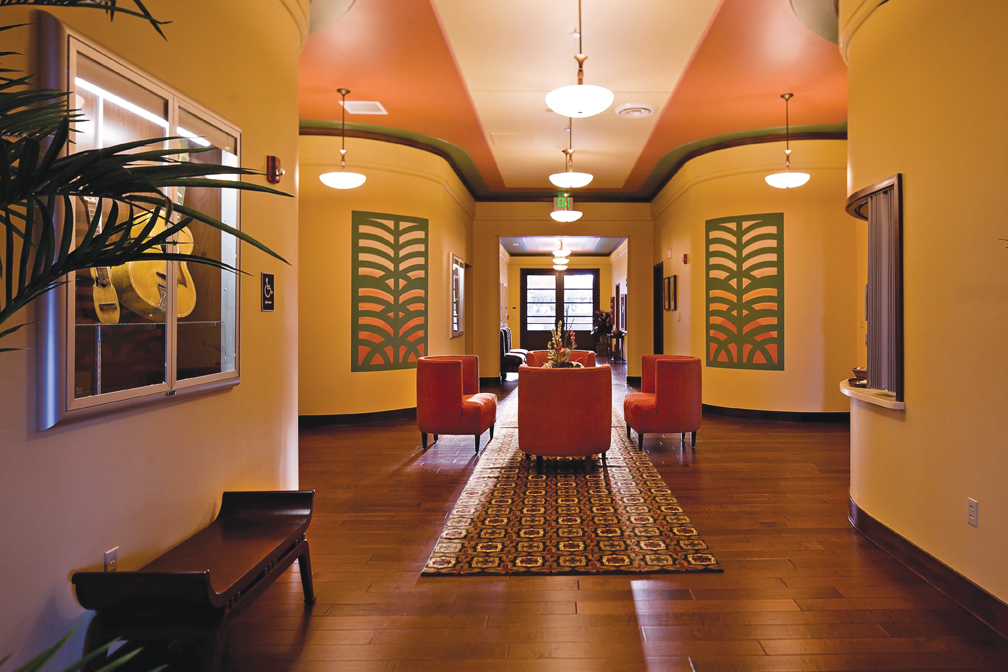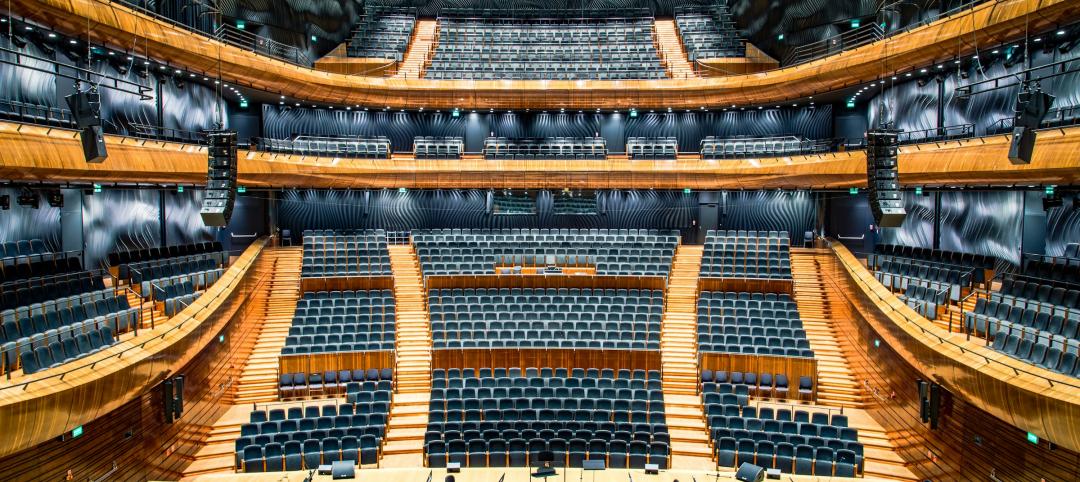The U.S. Air Force’s Joint Base Harbor-Hickam in Honolulu, Hawaii, is currently in the midst of an $820 million housing privatization project that includes the delivery of 1,208 new homes, 438 rehabilitated historic homes, housing and maintenance offices, two community centers, and a recreational sports complex.
At the heart of the project by developer Hickam Communities, Honolulu, Hawaii, is the reconstruction of the former Non-Commissioned Officer’s Mess Building (NCO Club), now known as the Ka Makani Community Center.
In 1935, Captain Howard B. Nurse designed the neighborhood master plan for Hickam, which included the NCO Club as a gathering place for noncommissioned officers and their spouses for rest and recreation.
Designed by Jozef B. A. Van Oort, a Dutch architect who came to Hawaii in 1935 and served as a chief architect of the U.S. Army Quartermaster Corps Construction Services, the single-story, cross-shaped concrete building is replete with Art Deco and Moderne details as well as with prominent Hawaiian tropical elements.
PROJECT SUMMARY
Ka Makani Community Center
Honolulu, HawaiiBuilding Team
Submitting firm: Lend Lease
Owner/developer: Hickam Communities LLC
Architect/architectural engineer: Mason Architects Inc.
Structural engineer: Shigemura, Lau, Sakanashi, Higuchi & Associates Inc.
MEP engineer: Lincolne Scott Inc.
General contractor/construction manager: KPRS Hawaii Construction Inc.
Construction/program manager: Lend LeaseGeneral Information
Size: 9,191 sf building
Construction cost: $5.6 million
Construction period: June 2009 to March 2011
Delivery method: Design-build
“Deco ornamentation is present in the large fluted column within the entry lanai and Moderne details are evident in the wide-radius corners,” says Julianne Polanco, director of cultural resources, Lend Lease, Schofield Barracks, Hawaii. “The building’s hip roof, wide roof overhangs, and large wood-framed sliding windows and doors are common to the Hawaiian-tropical style, as are the screened lanai, acid-stained concrete floors, and patterned concrete stamping.”
SUBTRACTION BY ADDITION
Over time, several additions–– a large, warehouse-like ballroom, a new kitchen, a laundry facility, mechanical equipment, even a barber shop––were made. The NCO Club ballooned in size to 26,000 sf, ultimately obscuring its cross-shape design.
Eventually, the building’s two lanais were permanently closed, the ceilings were lowered, the walls were covered with faux wood paneling, floors were carpeted, and the roof was covered with asphalt.
As the Hickam Communities’ rehabilitation project gained steam in 2009, it was evident that the former NCO Club, which had been abandoned for 15 years, should be rehabilitated as a community center and focal point of the housing development.
RETURNING TO THE ORIGINAL FOOTPRINT
The Building Team used Van Oort’s original drawings as a basis for the reconstruction of the NCO Club. However, there were still details that had yet to be discovered. “While we had an understanding of what was and was not the original building, it was the condition of the materials hidden by various upgrades and additions that remained unknown until construction commenced,” says Polanco.
All of the post-1941 additions to the exterior were removed, reducing the footprint of the building back to the original 10,000 sf. The lanai and dining terrace were reopened, original entry lanai light fixtures were refurbished and reinstalled. The original ceiling in the former lounge was exposed, revealing open beams with articulated wood molding painted in teal and gold. Faux wood paneling and lowered ceilings were removed, exposing portions of several large historic murals that were nearly destroyed by the previous alterations.
“The murals, hidden behind the additions to the building, were revealed. Unfortunately, the condition of the murals was such that they could not be retained or restored. As homage to their existence, the interior now has a few small decorative painted elements. The reintroduction of folding glass panel doors and the lanais were two elements that returned the building to its original charm,” says Polanco.
The general floor plan was retained, although some modifications were made to meet current needs. For example, the lounge became a multiuse room; the dining room was enlarged to become the entertainment room; the former card room was transformed into a fitness center; and the bar evolved into a computer room.
New wood flooring was installed in the main lobby and in the former lounge. The stone-line patterned acid-stained concrete floors in the old dining rooms were also restored to what Polanco calls “their original glory.”
“The retention of the concrete floors and other character-defining features allows visitors to share the same experience as visitors of the past,” says Polanco.
In addition being honored with a Silver Award in Building Design+Construction’s 2011 Reconstruction Awards, the Ka Makani Center has also won a Preservation Honors Award from the Historic Hawaii Foundation. It is also eligible for listing in the National Register of Historic Places.
“The rehabilitation of this building has been a success on many levels,” says Polanco. “From an aesthetic standpoint, the building has been returned to its rightful place as a graceful and pleasing focal point to the intentionally designed historic district.” +
Related Stories
Higher Education | Feb 9, 2024
Disability and architecture: ADA and universal design at college campuses
To help people with disabilities feel part of the campus community, higher education institutions and architects must strive to create settings that not only adhere to but also exceed ADA guidelines.
Codes | Feb 9, 2024
Illinois releases stretch energy code for building construction
Illinois is the latest jurisdiction to release a stretch energy code that provides standards for communities to mandate more efficient building construction. St. Louis, Mo., and a few states, including California, Colorado, and Massachusetts, currently have stretch codes in place.
Giants 400 | Feb 8, 2024
Top 10 Telecommunications Building Architecture Firms for 2023
Arcadis North America, CSArch, Interior Architects, and TETER top BD+C's ranking of the nation's largest telecommunications building architecture and architecture/engineering (AE) firms for 2023, as reported in Building Design+Construction's 2023 Giants 400 Report.
Giants 400 | Feb 8, 2024
Top 50 Public Library Architecture Firms for 2023
Quinn Evans, McMillan Pazdan Smith, PGAL, Skidmore, Owings & Merrill, and Gensler top BD+C's ranking of the nation's largest public library architecture and architecture/engineering (AE) firms for 2023, as reported in Building Design+Construction's 2023 Giants 400 Report.
Giants 400 | Feb 8, 2024
Top 60 Performing Arts Center and Concert Venue Architecture Firms for 2023
Populous, DLR Group, Gensler, HGA, and Perkins Eastman top BD+C's ranking of the nation's largest performing arts center and concert venue architecture and architecture/engineering (AE) firms for 2023, as reported in Building Design+Construction's 2023 Giants 400 Report.
Giants 400 | Feb 8, 2024
Top 70 Museum Architecture Firms for 2023
SmithGroup, Gensler, Ayers Saint Gross, Quinn Evans, HGA, and Cooper Robertson head BD+C's ranking of the nation's largest museum and gallery architecture and architecture/engineering (AE) firms for 2023, as reported in Building Design+Construction's 2023 Giants 400 Report.
Architects | Feb 8, 2024
LPA President Dan Heinfeld announced retirement
LPA Design Studios announced the upcoming retirement of longtime president Dan Heinfeld, who led the firm’s growth from a small, commercial development-focused architecture studio into a nation-leading integrated design practice setting new standards for performance and design excellence.
Market Data | Feb 7, 2024
New download: BD+C's February 2024 Market Intelligence Report
Building Design+Construction's monthly Market Intelligence Report offers a snapshot of the health of the U.S. building construction industry, including the commercial, multifamily, institutional, and industrial building sectors. This report tracks the latest metrics related to construction spending, demand for design services, contractor backlogs, and material price trends.
Giants 400 | Feb 6, 2024
Top 80 Religious Facility Architecture Firms for 2023
Parkhill, FGM Architects, GFF, Gensler, and HOK top BD+C's ranking of the nation's largest religious facility architecture and architecture engineering (AE) firms for 2023, as reported in the 2023 Giants 400 Report.
Modular Building | Feb 6, 2024
Modular fire station allows for possible future reconfigurations
A fire station in Southern California leveraged prefab, modular construction for faster completion and future reconfiguration.

















